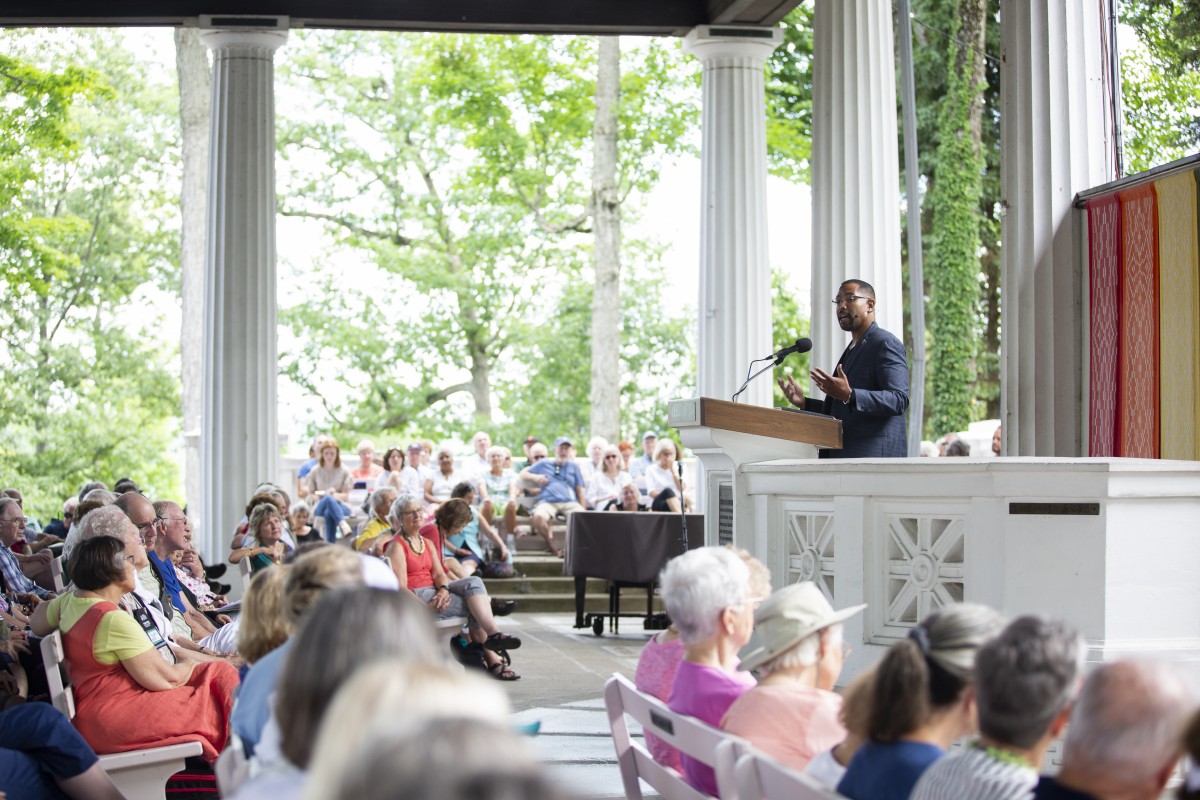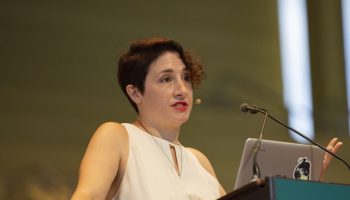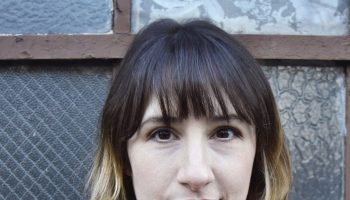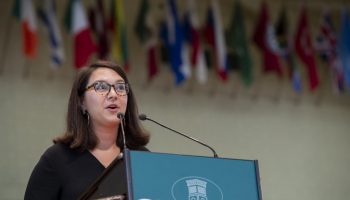
Before this week, Corey D. B. Walker considered the Institution a “school of democracy.” However, after choosing to wrestle with the ethics of dissent, he believes Chautauqua is changing its course to become a school of radical democracy, providing a space to explore the possibility of America at its best.
At 2 p.m. Thursday, July 26, in the Hall of Philosophy, Walker, vice president and dean of the Samuel DeWitt Proctor School of Theology of Virginia Union University, presented his lecture, “Is America Possible? An Ethics of Dissent in an Empire of Dissent,” as the last of Week Five’s theme, “The Ethics of Dissent.”
“The practices of the conversations that occur in this space and the leveraging of the convening power of this space remind us that the ethics of dissent are not so much ethical principles that we can divine from some space outside of the human experience, but instead they operate within the very practices of our everyday lives,” Walker said.
Walker said in order to start discussing dissent in America, Chautauquans need to understand that America is still a work in progress.
“When we spend our ideas and our time on this question, ‘Is America possible?’ what I want for us to do is not begin at a finished moment, not to think (of) America as a political project that has been completed and the only thing we need to do is to add some finishing touches on this project,” Walker said. “Instead, I want us to look foundationally to begin to really think, ‘How do we understand this project that we call America?’”
But Walker was not the first to question America’s boundless possibilities. He was inspired by Vincent Harding, an African-American scholar and historian, who wrote an essay on the topic in his book Hope and History: Why We Must Share the Story of the Movement.
“Harding invites us to engage this question ‘Is America possible?’ by opening up and thinking anew how we should live this experiment with democracy,” Walker said. “Harding wanted us to understand (that) by raising the question, we know that the answer is not final.”
Walker said Harding’s work helped him to understand the main challenge of discussing dissent: breaking the status quo.
“Dissent comes and dissent is known, not so much by the nature of what is. Dissent is understood as the articulation of what can be,” Walker said.
“In many ways, when we focus on dissent as that which is, we focus on the normative criteria that then defines dissent. But what I want us to do is to raise the level of dissent because dissent means that we have to interrogate the very foundations of what we think of as the norm.”
-Corey D.B. Walker, Vice president, dean, Samuel DeWitt Proctor School of Theology, Virginia Union University
Walker said the more he talks about the challenges surrounding the ethics of dissent, the more he is reminded of how complicated it is because it does not “follow an either/or mindset.”
“We can’t frame dissent, let alone an ethics of dissent, along a logic of ‘You are either Democrat or Republican, liberal or conservative, progressive or reactionary,’ ” he said. “If you want to contain me, if you want to then bog me down by the categories of existence, then you want to fit me within that category or framework, but that does not give us the very idea and complexity of what it means to live in our world today.”
Because dissent can’t follow an either/or logic or framework, the question of “Is America possible?” also categorically refuses an either/or response.
“To respond effectively to that question, we understand that it can’t be resolved by fear, it can’t be resolved by political rhetoric, it can’t be resolved by a singular movement, nor can it be resolved by a protest in one moment, in one space and in one time,” he said. “It refuses any simplistic thinking, or even speaking, of an ethics of dissent.”
Walker said America was founded on the expression of possibilities and the concept that America “is always a negotiation.”
In 1821, Thomas Jefferson and John Adams exchanged letters debating the idea of what constitutes a nation where there are groups of people excluded from the phrase “We the people,” Walker said.
“For Jefferson, the real question for him was a question that afflicted the states: ‘How do we deal with this unfortunate population?’” Walker said. “ ‘Are our slaves to be presented with freedom and a dagger?’ ”
Adams responded to Jefferson’s question by stating that he saw slavery as a “black cloud hanging over America.”
“You see, for Jefferson and for Adams, they understood that something that was called ‘America’ was not even a possibility just yet,” Walker said, “because there is something there that is challenging and constraining the very idea of America to express itself fully and definitely.”
In the Founding Fathers’ questioning of America’s inclusivity, they created the need for an “ethics of community,” a need Walker believes was best articulated by Martin Luther King Jr. Walker said King articulated an ethics of dissent from the moment he responded to his call to ministry in 1944.
“King began to articulate a modality of existence that brought into being new possibilities of human being and belonging,” Walker said.
In addition to belonging, Walker said King practiced surmounting freedom in a way that provided Americans with an exemplary practice of an ethics of dissent.
“It is a sermonic freedom that enables King to articulate an ethics of dissent that is not something of the same; it is an ethics that is framed from the architecture of trying to respond to the question, ‘Is America possible?’ by articulating a new possibility that exceeds America,” Walker said.
Walker believes King utilized the space of the sermon to challenge not only the sovereignty of the nation, but to articulate a new “mode of being human in the world” through his faith.
“In many ways, we can’t hear King,” Walker said. “We can’t understand his sermon because King was a follower, not of Christianity, but a religion of that first-century Palestinian Jew named Jesus. King’s sermonic freedom was framed on the architecture of a cross.”
Walker said King had a natural desire to serve humanity that enabled him to confront not only the question of America’s possibility, but also of religion’s role in its possibility.
“He fused (possibility) with a language of morality that questioned, ‘What does our religion say to them?’ ” Walker said. “They who are the poor, the disinherited, the dispossessed. It was a dissent framed not only by the architecture of what is politically possible, but it was a dissent of what is spiritually unimaginable.”
According to Walker, King’s intertwining of religion and American possibility sparked a new question: Are people going to identify with the crucified or the crossmakers? The answer, Walker said, defines why an ethics of dissent has no simple solution, but is still one worth working on.
“In many ways, these cross-shaped words of Jesus reminds us that an ethics of dissent is not something that is easy, it is not something that is simplistic and it is not something that will enable us to continue with the comfort of our lives,” he said. “It is the only way in which we can articulate life eternal and the only way that we can have life worth living.”




